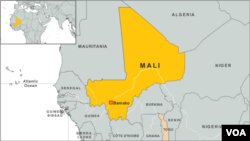DAKAR —
The Malian government has ordered all schools shut down in the capital and a nearby garrison town following demonstrations in the two cities. Some 800 kilometers south of the front line where the army is fighting to hold back Islamic militants, people are increasingly frustrated with a worsening economic situation and what many call government inaction.
All schools, from kindergarten to university, are closed until further notice in the Malian capital Bamako and the nearby garrison town of Kati about 15 kilometers away.
On Wednesday hundreds of people marched in the streets of Bamako and Kati - the base of the military junta that ousted President Amadou Toumani Touré last March. The demonstrators - led by a number of civil society and political groups - called for a national dialogue on political reforms. Many were calling for interim President Dioncounda Traoré to step down for failure to liberate northern Mali
One Bamako resident said among the hundreds of marchers many were students. Another political coalition issued a communiqué denouncing the decision to hold such demonstrations while fighting is underway at the front lines in central Mali.
In a communiqué read out on state television - on Wednesday and again on Thursday - the government said now is not the time for public disturbances - rather, “at a time when Mali faces one of the direst periods in its history all citizens should unite behind the army in the fight to take back the north”.
The government said it was closing schools in the face of growing civil unrest and a risk of political manipulation. Schools will be shut “until the situation calms down”, according to the statement.
Bamako residents say things are not likely to calm down anytime soon if the socio-economic situation does not start to improve.
Some schools were already closed because of teachers’ unions’ strikes. Malians are struggling to cope with the economic fallout of instability that has gripped the country since a coup d’état last March. Political uncertainty reigns in the capital since an interim civilian government took power, the army is fighting to keep Islamic militants at bay, and tourism - long the source of income for countless families - is all but dead.
Some heads of households who used to have four or five mouths to feed now have 10 or 15, with an influx of family members who have fled to Bamako from the occupied north. Many people with automobiles have stowed them away, for lack of money to buy fuel.
Professor Issa Ndiaye, a political analyst in Bamako, says the political crisis in Mali today only accentuates the socio-economic crisis and there is a general sense of discontent among the people - things could explode at any moment.
He says the general sense among the people is that those in power - both civilian and military - are doing nothing to resolve Mali’s problems. He says people are utterly fed up.
Interim President Traoré is scheduled to address the nation on Friday.
All schools, from kindergarten to university, are closed until further notice in the Malian capital Bamako and the nearby garrison town of Kati about 15 kilometers away.
On Wednesday hundreds of people marched in the streets of Bamako and Kati - the base of the military junta that ousted President Amadou Toumani Touré last March. The demonstrators - led by a number of civil society and political groups - called for a national dialogue on political reforms. Many were calling for interim President Dioncounda Traoré to step down for failure to liberate northern Mali
One Bamako resident said among the hundreds of marchers many were students. Another political coalition issued a communiqué denouncing the decision to hold such demonstrations while fighting is underway at the front lines in central Mali.
In a communiqué read out on state television - on Wednesday and again on Thursday - the government said now is not the time for public disturbances - rather, “at a time when Mali faces one of the direst periods in its history all citizens should unite behind the army in the fight to take back the north”.
The government said it was closing schools in the face of growing civil unrest and a risk of political manipulation. Schools will be shut “until the situation calms down”, according to the statement.
Bamako residents say things are not likely to calm down anytime soon if the socio-economic situation does not start to improve.
Some schools were already closed because of teachers’ unions’ strikes. Malians are struggling to cope with the economic fallout of instability that has gripped the country since a coup d’état last March. Political uncertainty reigns in the capital since an interim civilian government took power, the army is fighting to keep Islamic militants at bay, and tourism - long the source of income for countless families - is all but dead.
Some heads of households who used to have four or five mouths to feed now have 10 or 15, with an influx of family members who have fled to Bamako from the occupied north. Many people with automobiles have stowed them away, for lack of money to buy fuel.
Professor Issa Ndiaye, a political analyst in Bamako, says the political crisis in Mali today only accentuates the socio-economic crisis and there is a general sense of discontent among the people - things could explode at any moment.
He says the general sense among the people is that those in power - both civilian and military - are doing nothing to resolve Mali’s problems. He says people are utterly fed up.
Interim President Traoré is scheduled to address the nation on Friday.




